 It's nobody's business but their own. 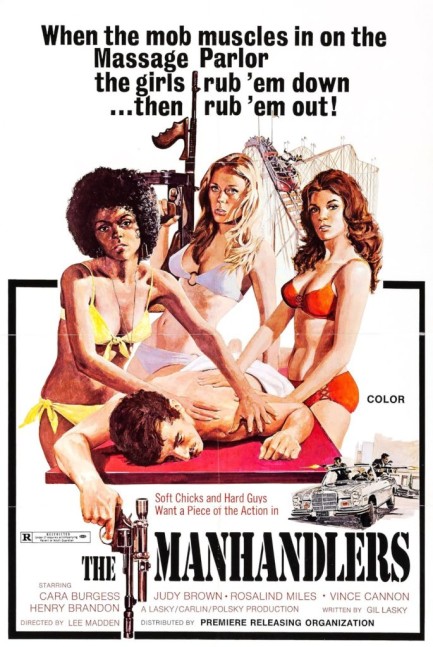
Manhandlers, right? It's a good title for a sexploitation movie, and John Solie painted a nice promo poster, but the actual product is a limp drama with dopy comedic episodes about a woman played by Cara Burgess who inherits her mobbed up uncle's L.A. massage parlor and finds that it's a front for a brothel. Her uncle was killed for being uncooperative with the mafia, and now they come after her, trying to intimidate her into signing away half of the place's profits. One the one hand, she'd supposedly net a nice income just for looking the other way and doing nothing. On the other, she'd be giving in to organized crime. The answer? Fill both hands with scented oil, massage the mob into a sense of false security, then make her move. None of it is as interesting as it sounds, at no point are machine guns wielded, and for sexploitation the extracurriculars aren't very erotic, even with Judy Brown and Rosalind Miles in support. You can give this one a pass. The Manhandlers premiered—and went limp at the box office—today in 1974.
 Grier tries to foil an assassination plot. 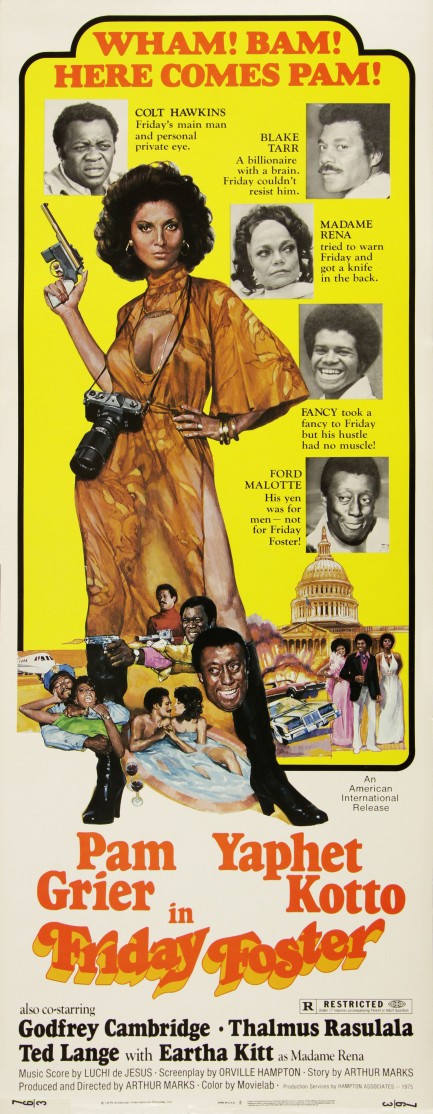
It's Christmas day, and what is the main thing everyone does today? They go overboard. So in that vein we have more posts for you than you could have rightly expected, though we'll admit we wrote them in advance and right now we're nowhere near a computer. We're starting the X-mas treats with this vintage poster for the Pam Grier blaxploitation flick Friday Foster, a film that opened in U.S. today in 1975. After successes with Coffy, Foxy Brown, et al, American International Pictures steered Pam a bit more mainstream with the PG rated Sheba, Baby and learned from that mistake. So they turned the heat back up, scheduled a Christmas release date, and gave Grier fans a movie with twice the action, twice the humor, and twice the tongue-in-cheek factor as usual, plus three steamy Grier nude scenes rather than the usual two.
Grier plays a photo-journalist who tries to get a sneaky paparazzi shot of a reclusive millionaire only to find herself photographing an assassination attempt-turned-bloodbath. While American International kicked things up a notch, the customary Grier grit is missing, as too many wisecracks and camp moments leave the film without any heft. It almost seems as if, with a full blown international star on its hands and costs rising, American International decided to cut corners in pre-production. Script-wise Friday Foster is too formulaic and self-conscious. Soundtrack-wise, instead of songs performed by a viable R&B artist, it has cheeseball wacka wacka interstitial music, with chick singers trilling, “Hey Friday, whatcha doin' girl, hey, whatcha doin' girl whatcha doin'.” Direction-wise, four-time Grier collaborator Jack Hill has been tossed in favor of Arthur Marks, who came up directing episodes of the television show Perry Mason.
Friday Foster was Grier's last go-round with American International, and a good thing, because somebody forgot she became popular playing a streetwise, ass-kicking, So-Cal soul sister. Her turn as a middle-class photo-journalist might have worked, but not with the support she needed chopped from under her. American International wanted to mainstream her, except it had no idea how to do it. But Grier's still Grier, and even stuck in what feels like a washed out version of her better films, she remains as watchable as any star of her era. After another couple of years the work would come in spurts, a small part here, a television show there, an occasional lead role, yet bit by bit, appearance by appearance, Grier would stitch together a career spanning four decades and counting. Friday Foster is isn't the best entry on her résumé, but even midding Grier is worthwhile Grier.
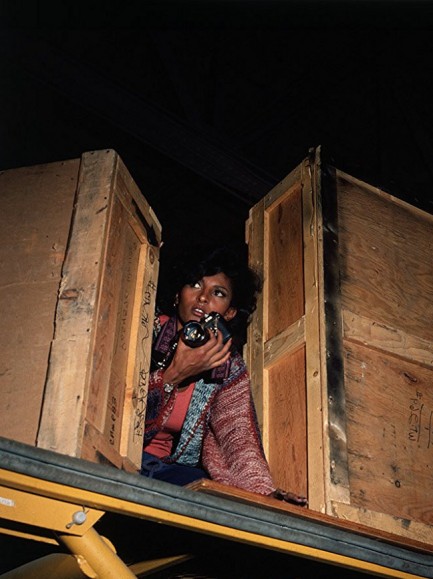 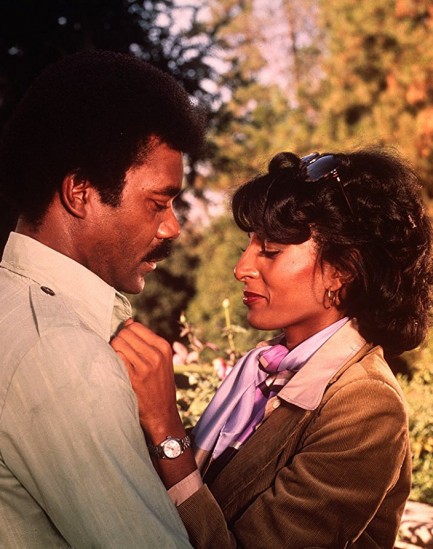 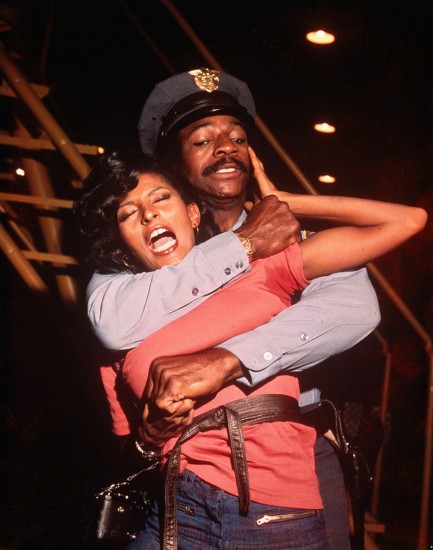 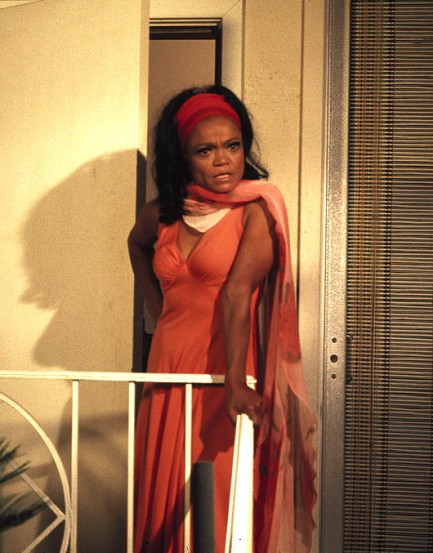 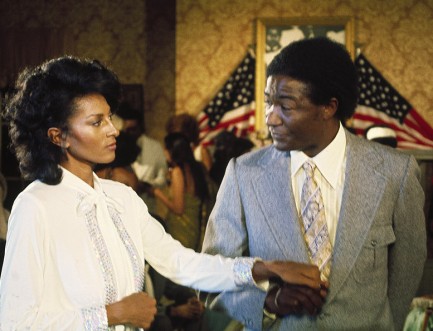  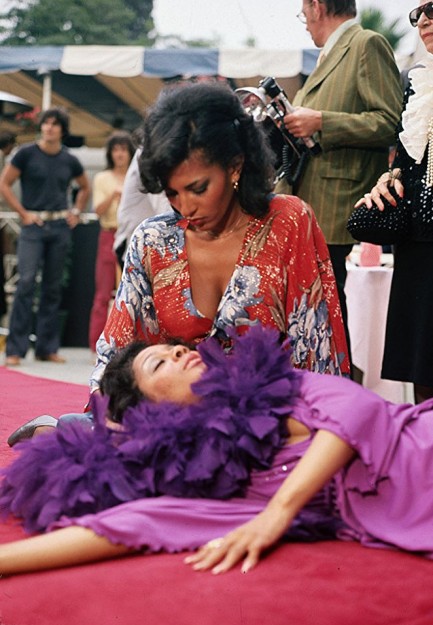 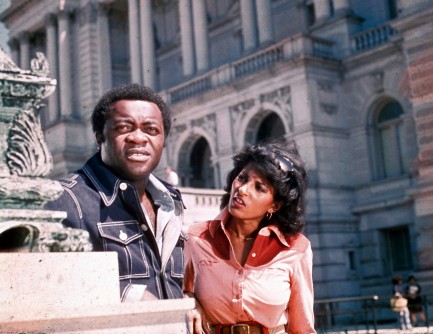 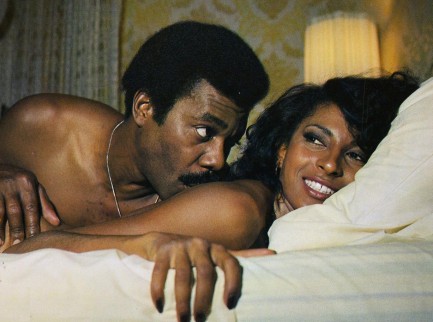 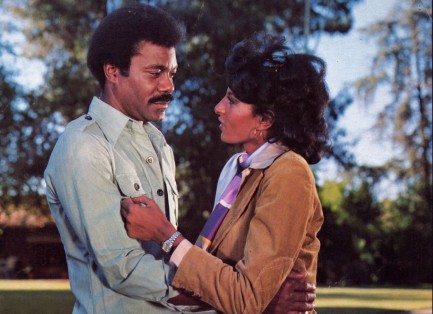
 Who’s the man? If you don’t know you better ask somebody. 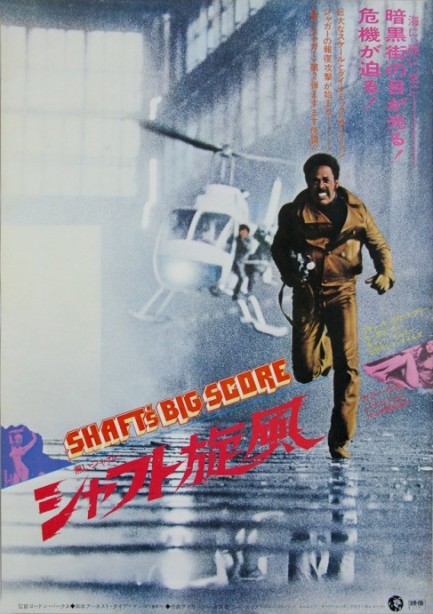
After scoring a huge hit with the 1971 detective drama Shaft, Metro-Goldwyn-Mayer doubled down by rushing out a bigger budgeted sequel the next year. It was called Shaft’s Big Score, and you see the Japanese promo above, made for its Tokyo premiere today in 1972. Some of the acting in Score isn’t great, which was also true of the first film, but as a whole it makes a nice companion piece to Shaft. John Shaft gets in the middle of the Italian and black mobs in New York City, and along the way there are brawls, bullets, and lots of badassedness. The movie also features blaxploitation heavyweights Moses Gunn, Wally Taylor, Drew Bundini Brown, and female foils Kathy Imrie, Rosalind Miles, and the amazing Kitty Jones. 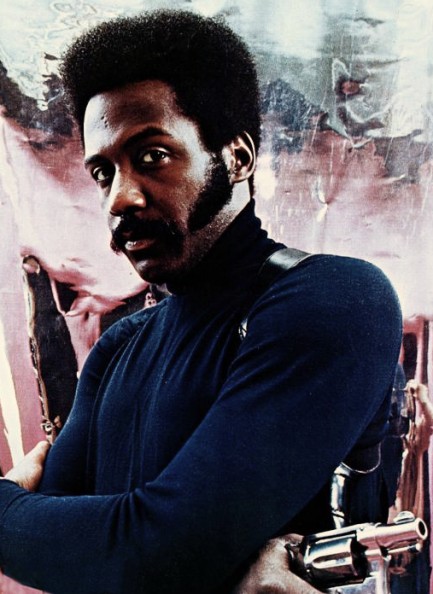 A long while back when discussing the 1968 movie 100 Rifles, we talked about the honesty of cinema from that period. It's a quality that extends into blaxploitation as well. When we say honesty, we don’t mean correctness. Casual racism abounds in blaxploitation, and of course sexism and homophobia make appearances too. But at least the genre acknowledges racial discord as an everyday element of American life. Unfortunately, Hollywood has devoted more and more time over the last thirty years to making soulless action epics and laughless comedies, constantly reassuring ticket buyers that everything is hunky dory. Yes, Hollywood would occasionally take on racial issues in big, Oscar grubbing dramas, but nearly all of those movies, no matter how downbeat, had an implicit message that America was getting better. Well, guess what? It isn’t. A long while back when discussing the 1968 movie 100 Rifles, we talked about the honesty of cinema from that period. It's a quality that extends into blaxploitation as well. When we say honesty, we don’t mean correctness. Casual racism abounds in blaxploitation, and of course sexism and homophobia make appearances too. But at least the genre acknowledges racial discord as an everyday element of American life. Unfortunately, Hollywood has devoted more and more time over the last thirty years to making soulless action epics and laughless comedies, constantly reassuring ticket buyers that everything is hunky dory. Yes, Hollywood would occasionally take on racial issues in big, Oscar grubbing dramas, but nearly all of those movies, no matter how downbeat, had an implicit message that America was getting better. Well, guess what? It isn’t. Nearly half of America’s prisoners are inside for drugs, and 40% of that subset is black, even though whites are more likely to sell drugs, and they consume the same amount as blacks—not only per capita, but by percentage. Multiple studies show the same result. Despite this, black drug offenders land inside the increasingly for-profit prison industry at 10.1 times the rate of whites. Uncomfortable facts, but facts they are. Blaxploitation movies acknowledge a wide range of social problems while weaving them into the fabric of popular cinema. Nobody walked away from Shaft’s Big Score thinking that America was becoming a post-racial Eden, yet nobody walked away denying that the movie was immense fun. Entertainment that reflects the real world. Is that really so hard to do? 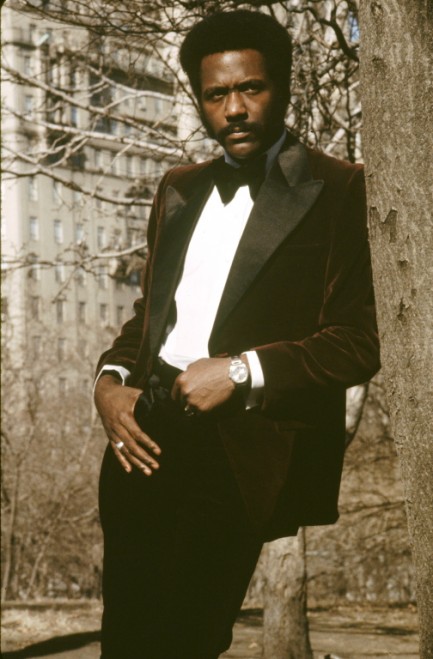 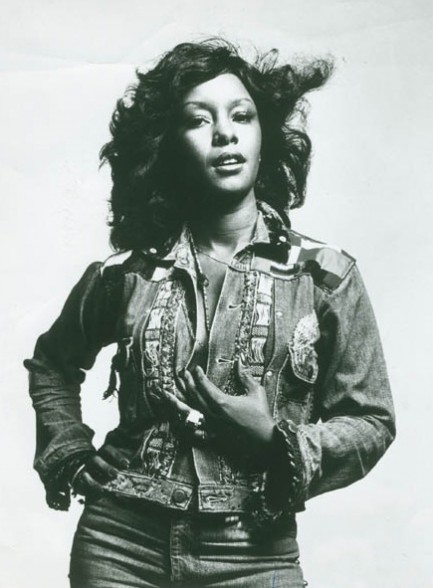 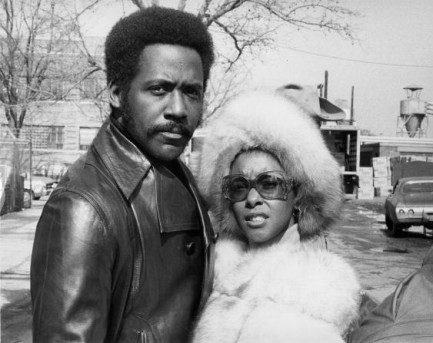 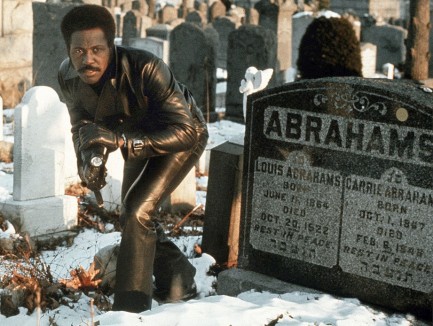
 Trouble in the distance. 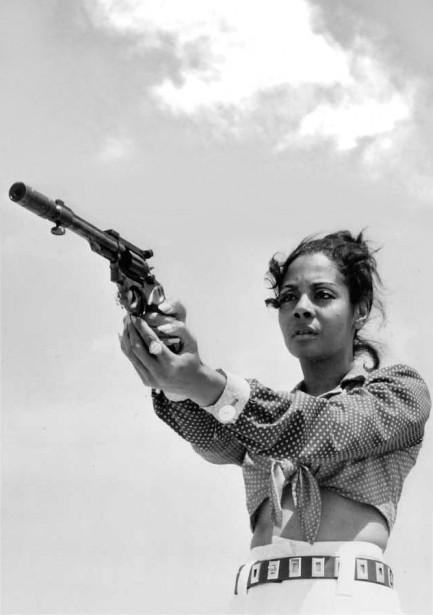
This great promo of American actress Rosalind Miles was made for her role in the low budget Georgina Spelvin actioner Girls for Rent, aka I Spit on Your Corpse. Don’t ask. Anyway, Miles is probably more familiar to movie buffs for Shaft’s Big Score, and she also appreared in Friday Foster, The Black 6, and on several television shows. This image dates from 1974.
|
 |

The headlines that mattered yesteryear.
1927—Mae West Sentenced to Jail
American actress and playwright Mae West is sentenced to ten days in jail for obscenity for the content of her play Sex. The trial occurred even though the play had run for a year and had been seen by 325,000 people. However West's considerable popularity, already based on her risque image, only increased due to the controversy. 1971—Manson Sentenced to Death
In the U.S, cult leader Charles Manson is sentenced to death for inciting the murders of Sharon Tate and several other people. Three accomplices, who had actually done the killing, were also sentenced to death, but the state of California abolished capital punishment in 1972 and neither they nor Manson were ever actually executed. 1923—Yankee Stadium Opens
In New York City, Yankee Stadium, home of Major League Baseball's New York Yankees, opens with the Yankees beating their eternal rivals the Boston Red Sox 4 to 1. The stadium, which is nicknamed The House that Ruth Built, sees the Yankees become the most successful franchise in baseball history. It is eventually replaced by a new Yankee Stadium and closes in September 2008. 1961—Bay of Pigs Invasion Is Launched
A group of CIA financed and trained Cuban refugees lands at the Bay of Pigs in southern Cuba with the aim of ousting Fidel Castro. However, the invasion fails badly and the result is embarrassment for U.S. president John F. Kennedy and a major boost in popularity for Fidel Castro, and also has the effect of pushing him toward the Soviet Union for protection.
|

|
|

It's easy. We have an uploader that makes it a snap. Use it to submit your art, text, header, and subhead. Your post can be funny, serious, or anything in between, as long as it's vintage pulp. You'll get a byline and experience the fleeting pride of free authorship. We'll edit your post for typos, but the rest is up to you. Click here to give us your best shot.

|
|
















 A long while back when discussing the 1968 movie 100 Rifles, we talked about the honesty of cinema from that period. It's a quality that extends into blaxploitation as well. When we say honesty, we don’t mean correctness. Casual racism abounds in blaxploitation, and of course sexism and homophobia make appearances too. But at least the genre acknowledges racial discord as an everyday element of American life. Unfortunately, Hollywood has devoted more and more time over the last thirty years to making soulless action epics and laughless comedies, constantly reassuring ticket buyers that everything is hunky dory. Yes, Hollywood would occasionally take on racial issues in big, Oscar grubbing dramas, but nearly all of those movies, no matter how downbeat, had an implicit message that America was getting better. Well, guess what? It isn’t.
A long while back when discussing the 1968 movie 100 Rifles, we talked about the honesty of cinema from that period. It's a quality that extends into blaxploitation as well. When we say honesty, we don’t mean correctness. Casual racism abounds in blaxploitation, and of course sexism and homophobia make appearances too. But at least the genre acknowledges racial discord as an everyday element of American life. Unfortunately, Hollywood has devoted more and more time over the last thirty years to making soulless action epics and laughless comedies, constantly reassuring ticket buyers that everything is hunky dory. Yes, Hollywood would occasionally take on racial issues in big, Oscar grubbing dramas, but nearly all of those movies, no matter how downbeat, had an implicit message that America was getting better. Well, guess what? It isn’t.









































































